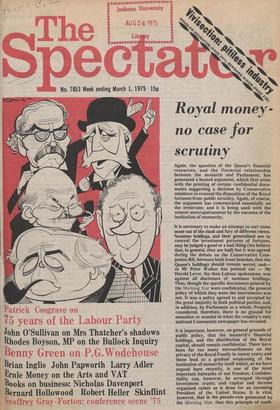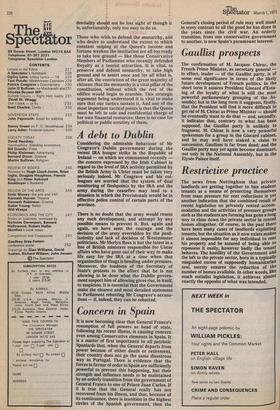Royal money no case for scrutiny
Again, the question of the Queen's financial resources, and the financial relationship between the monarch and Parliament, has generated a heated argument, which first arose with the printing of certain f;onfidential documents suggesting a decision by Conservative ministers to conceal the disposition of the Royal fortunes from public scrutiny. Again, of course, the argument has concentrated essentially on the irrelevant; and it is being used with the utmost unscrupulousness by the enemies of the institution of monarchy.
It is necessary to make an attempt to sort some sense out of the clash and fury of different views. Nominee holdings, and their generalised use to conceal the investment patterns of fortunes, may be judged a good or a bad thing (we believe that, in general, they are bad) but it was agreed during the debate on the Conservative Companies Bill, between both front benches, that the Queen's holdings should remain secret; and— as Mr Peter Walker has pointed out — Mr Harold Lever, the then Labour spokesman, was against all disclosure of nominee holdings. Thus, though the specific documents printed by the Morning Star were confidential, the general policy of which they were the instruments was not. It was a policy agreed to and accepted by the great majority in both political parties, and, in addition, by Parliament as a whole. Properly considered, therefore, there is no ground for sensation or scandal in what the country's only national Communist newspaper has revealed.
It is important, however, on general grounds of public policy, that the monarch's financial holdings, and the distribution of the Royal capital, should remain confidential. There have been far too many encroachments on the privacy of the Royal Family in recent years; and these lead to a gradual weakening of the institution of monarchy itself which, as we have argued here recently, is one of the most important bulwarks of our freedom. Confidentiality can, however, be arranged through investment trusts; and capital and income organised rather as is done for an incoming President of the United States. It is vital, however, that in the pseudo-row generated by the Morning Star, that this principle of confi dentiality should not be lost sight of though it is, unfortunately, only too easy to do so.
Those who wish to defend the monarchy, and who desire to understand the extent to which constant sniping at the Queen's income and fortune weaken the institution are all too ready to take low ground — like those Conservative Members of Parliament who recently defended Royalty as a tourist attraction. It is vital, to preserve and defend monarchy, to take high ground and to assert once and for all what is, after all, the conviction of the great majority of citizens: that the monarchy is a vital pillar of the constitution, without which the rest of the edifice would begin to crumble. This strategic argument being understood it is vital to make sure that our tactics sustain it. And one of the most important tactical points is that the Queen must be left in sole and confidential charge of her own financial resources: there is no case for political or public scrutiny of them.
A debt to Dublin
Considering the admirable behaviour of Mr Cosgrave's Dublin government during the recent IRA hunger strike in the Republic of Ireland — on which we commented recently — the concern expressed by the Irish Cabinet in regard to the level of IRA activity permitted by the British Army in Ulster must be taken very seriously indeed. Mr Cosgrave and his colleagues are worried that the system of dual monitoring of flashpoints by the IRA and the army during the ceasefire may lead to a situation in which the Provisionals would be in effective police control of certain parts of the province.
There is no doubt that the army would resent any such development, and attempt by any possible means to prevent it. But, again and again, we have seen the courage and the decision of the army overridden by the pusillanimity and lack of decision of Westminster politicians. Mr Merlyn Rees is but the latest in a line of British ministers responsible for Ulster affairs who have gone out of their way to make life easy for the IRA at a time when that organisation of thugs is bending under pressure. Moreover, the loudness of the Secretary of State's protests to the effect that he is not allowing to be done what the Dublin government suspect him of allowing gives rise, in itself, to suspicion. It is essential that the Government make the clearest and most detailed statement to Parliament rebutting Mr Cosgrave's accusations — if, indeed, they can be rebutted.
Concern in Spain
It is now becoming clear that General Franco's resumption of full powers as head of state, following his recent illness, is causing concern even among Conservative elements in Spain. It is a matter of first importance to all patriotic Spaniards that, when the General departs from power because of either death or retirement, their country does not go the same disastrous way as Portugal. There is evidence that the forces in favour of order in Spain are sufficiently powerful to prevent this happening, but their strength and influence needs to be maintained by an orderly transition from the government of General Franco to one of Prince Juan Carlos. If it is true that the General really has not recovered from his illness, and that, because of its continuance, there is inanition in the highest circles of the Spanish government, then the General's closing period of rule may well stand in sorry contrast to all the good he has done in the years since the civil war. An orderly transition, from one conservative government to another, is now Spain's paramount interest.
Gaullist prospects
The confirmation of M. Jacques Chirac, the French Prime Minister, as secretary general — in effect, leader — of the Gaullist party, is of some real significance in terms of the likely future development of French politics. In the short term it assures President Giscard d'Estaing of the loyalty of what is still the most powerful parliamentary grouping of the Assembly; but in the long term it suggests, firstly, that the President will find it more difficult to get rid of M. Chirac as Prime Minister — should he eventually want to do that — and, secondly, it indicates that, contrary to what has been supposed, the Gaullist party is unlikely to fragment. M. Chirac is now a very powerful spokesman for a group in the Giscard cabinet, and he may well have staked a claim to succession. Gaullism is far from dead; and the Gaullist party may yet again become dominant, not only in the National Assembly, but in the Elysee Palace itself.
Restrictive practice The news from Nottingham that private landlords are getting together to ban student tenants as a means of protecting themselves from mass pressure for rent reductions is yet another indication that the combined result of recent legislation on privately rented accommodation and the activities of pressure groups such as the students are forming has gone a long way to close down the private sector in rented homes altogether. Of course, in the past there have been many cases of landlords exploiting tenants; but the situation as it now exists makes it almost impossible for any individual to rent his property and be assured of being able to repossess it easily, however badly the tenant behaves. The hostility of the Government and the left to the private sector, born in a typically misguided excess of supposedly humanitarian zeal, merely ensures the reduction of the number of homes available. In other words, like much socialist legislation, it achieves almost exactly the opposite of what was intended.


































